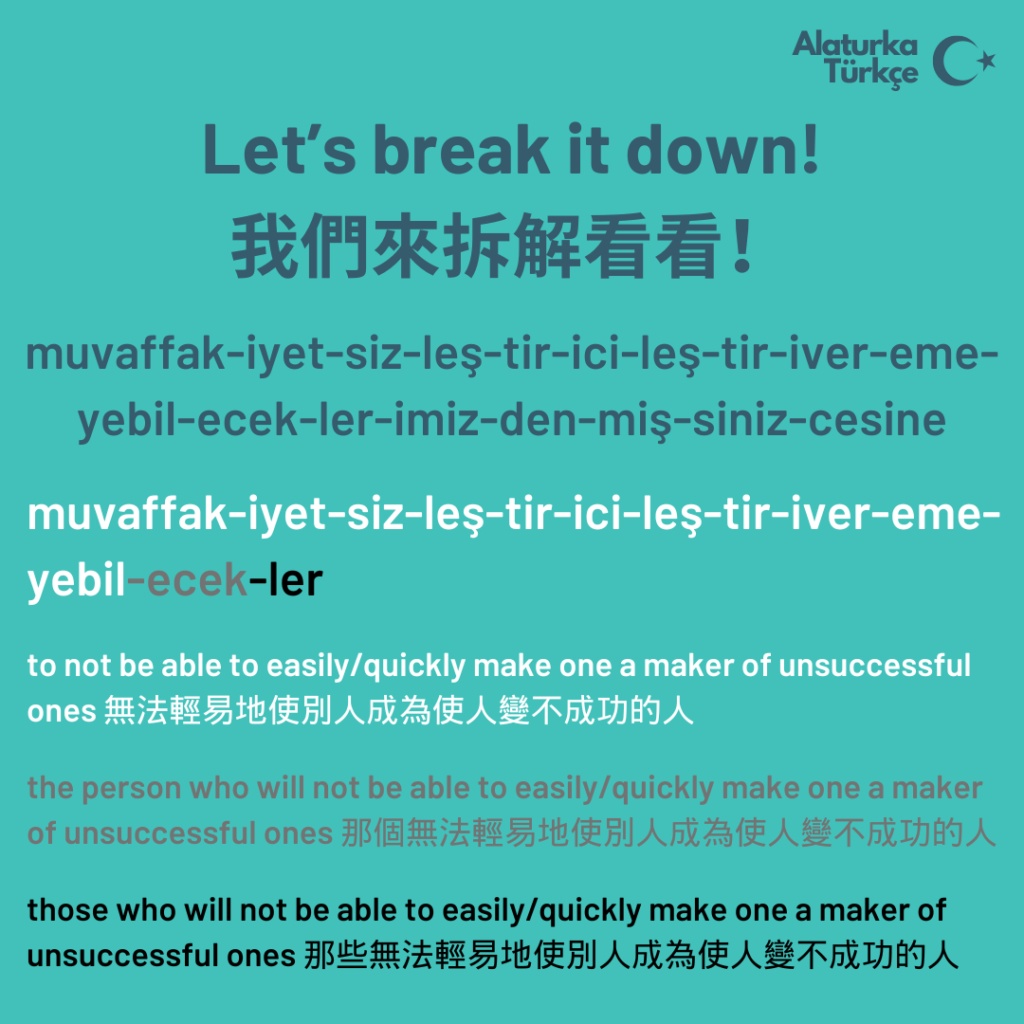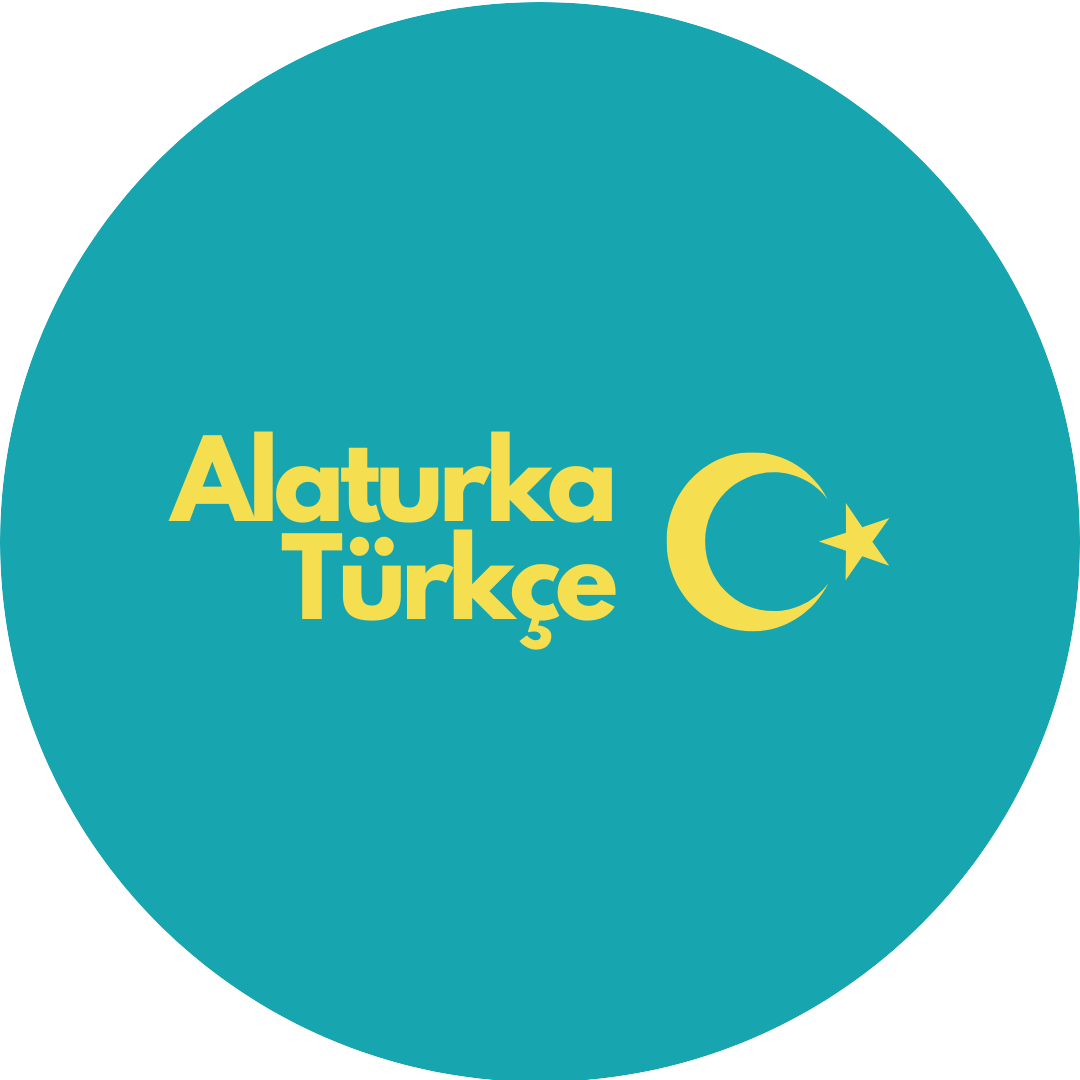[This article is written in both English and Chinese. Scroll down to read in either language. 本篇文章有英文和中文版本,可下滑看任一語言版本。]
Did you know that the longest word in Turkish is “muvaffakiyetsizleştiricileştiriveremeyebileceklerimizdenmişsinizcesine” with 70 letters? And it means “as though/if you were from those whom we may not be able to easily make into a maker of unsuccessful ones.” Strictly speaking, as its translation shows, it doesn’t even sound like a word. But since Turkish is an agglutinative language, as is a common trait of the Turkic language family, we can keep adding suffixes to a “word” to render different meanings and make different sentences, and it’ll still appear in the form of a word when it actually is a sentence or a clause (in the case here, it’s a clause).
An earlier title holder of the longest Turkish word is the popular tongue twister: “Çekoslovakyalılaştıramadıklarımızdan mısınız?” (Are you one of those people whom we could not make to be Czechoslovakian?) However, it isn’t considered a word since it’s actually a question which consists of two words. Also, the former state of Czechoslovakia is no more after its dissolution.
Now let’s break it down based on its units (morphemes) that form the word: muvaffak-iyet-siz-leş-tir-ici-leş-tir-iver-eme-yebil-ecek-ler-imiz-den-miş-siniz-cesine. From this breakdown, we can learn the amazing structure of Turkish word formation by delving into each building block.

muvaffak: successful → It’s an adjective. The more common word for it in modern Turkish is “başarılı,” which is also a native Turkish word, that is, it isn’t a loanword from another language.
muvaffakiyet: success → With the suffix “iyet” which comes from Arabic, it becomes a noun and thus means success. The native Turkish suffixes to nominalize (make into a noun) are “-lik, -lık, -lük, -luk.”
muvaffakiyetsiz: unsuccessful → “-siz, -sız, -süz, -suz” is the suffix that means “without …” So muvaffakiyetsiz is literally “without success” that comes to mean “unsuccessful.”

muvaffakiyetsizleş-: to become unsuccessful → “leş-, laş-” is a suffix that verbalizes a word to mean “to become …”
muvaffakiyetsizleştir-: to make one unsuccessful → “tir-, tır-, tür-, tur-; dir-, dır-, dür-, dur-” is a suffix that means “to make someone do something”
muvaffakiyetsizleştirici: maker of unsuccessful ones → “-(i)ci, -(ı)cı, -(ü)cü, -(u)cu; çi, çı, çü, çu” is a suffix that means “a person who makes something.” As a profession, it’s also used to mean someone who sells something, i.e. the seller of something, the place of the business. For example, a kitapçı is a seller of books, or a bookstore.

muvaffakiyetsizleştiricileş-: to become a maker of unsuccessful ones → Same rule as above.
muvaffakiyetsizleştiricileştir-: to make one a maker of unsuccessful ones → Same rule as above.
muvaffakiyetsizleştiricileştiriver-: to easily/quickly make one a maker of unsuccessful ones → The suffix “-iver-, -ıver-, -üver-, -uver-” is used to convey the swiftness of an action, or the ease with which an action is performed.

muvaffakiyetsizleştiricileştiriveremeyebil-: to not be able to easily/quickly make one a maker of unsuccessful ones → This structure comprises negation + ability/possibility auxiliary.
muvaffakiyetsizleştiricileştiriveremeyebilecek: the person who will not be able to easily/quickly make one a maker of unsuccessful ones → “-ecek, -acak” is the future tense.
muvaffakiyetsizleştiricileştiriveremeyebilecekler: those who will not be able to easily/quickly make one a maker of unsuccessful ones → “-ler, -lar” is the plural form.

muvaffakiyetsizleştiricileştiriveremeyebileceklerimiz: those whom we will not be able to easily/quickly make a maker of unsuccessful ones → Along with -ecekler, -eceklerimiz becomes a relative clause. Together with the verb in the future tense plus negation that comes before it, -emeyebileceklerimz means “things/people that we won’t be able to V.”
muvaffakiyetsizleştiricileştiriveremeyebileceklerimizden: among/from those whom we will not be able to easily/quickly make a maker of unsuccessful ones → “-den, -dan” is the ablative case, meaning “from.”
muvaffakiyetsizleştiricileştiriveremeyebileceklerimizdenmiş: he/she happens to be have been from (among) those whom we will not be able to easily/quickly make a maker of unsuccessful ones → “-miş, -mış, -müş, -muş” basically serves two functions:
1.) the past tense suffix that indicates the speaker didn’t witness the action in person but rather heard about it (e.g. from news, a friend etc.): e.g. Onlar filmi Paris’te çekmişler. (They shot the film in Paris.)
2.) used when the speaker just realized it: e.g. Kitabı derse getirmeyi unutmuşum. (I forgot to bring the book to class.) Here the sentence indicates that the speaker just realized that he/she forgot to bring the book to class.

muvaffakiyetsizleştiricileştiriveremeyebileceklerimizdenmişsiniz: you happen to be have been from (among) those whom we will not be able to easily/quickly make a maker of unsuccessful ones → “-siniz, -sınız, -sünüz, -sunuz” is the ending used in verbs, nouns and adjectives for the pronoun “you plural or you in the respectful form.”
muvaffakiyetsizleştiricileştiriveremeyebileceklerimizdenmişsinizcesine: as though/as if you happen to be have been from (among) those whom we will not be able to easily/quickly make a maker of unsuccessful ones [it can also translate to: as though/as if you were from those whom we will/may not be able to easily/quickly make (into) a maker of unsuccessful ones] → “-cesine, -casına, -çesine, -çasına” is a suffix added to convey the feeling “as though/as if.”

And now it’s your turn! Try to break down the sentence “Çekoslovakyalılaştıramadıklarımızdan mısınız?” using the rules you just learned and write it down in the comments. 🙌
[中文]
你知道嗎?最長的的土耳其文字是「muvaffakiyetsizleştiricileştiriveremeyebileceklerimizdenmişsinizcesine」,共有70個字母,他的意思是:似乎你剛好是那些我們無法輕易地使變成使別人成為使人變不成功的人之一的人。嚴格說起來,如同所見的翻譯,這聽起來根本不像一個字。但因為土耳其語是一個膠著性語言,並且膠著性是突厥語系裡面語言的共同特徵,我們可以藉由不斷地加後綴詞於字尾,來表達不同意思,並造不同句子,而這仍會看起來像是一個字(意即中間沒有空格,仍是一個字的狀態),雖然實際上他已是一個句子或是子句(在這邊,這個字就他的意思和結構而言,是一個子句)。
擁有最長土耳其文字頭銜的字先前是這個為人熟知的繞口令:「Çekoslovakyalılaştıramadıklarımızdan mısınız?」(你是那些我們無法變成捷克斯洛伐克人的其中之一人嗎?)然而,這不能算是一個字,因為他其實是一個句子,涵蓋了兩個字。並且,稱作捷克斯洛伐克的這個國家在其解體後也不復存在。[編按:捷克斯洛伐克(Czechoslovakia)為存在於1918年至1992年的一個中東歐國家。1992年時,捷克斯洛伐克以和平不流血的方式順利完成了國家分裂,兩塊地區分別獨立成捷克共和國和斯洛伐克共和國,史稱「天鵝絨分離」。]
現在我們就一起來依照這個字的語素(語言中最小的有意義單位)進行拆解來看看是什麼意思吧:muvaffak-iyet-siz-leş-tir-ici-leş-tir-iver-eme-yebil-ecek-ler-imiz-den-miş-siniz-cesine。從結構的拆解,藉由了解每個組成要素,我們可以發現土耳其文字組成結構的奧妙。

muvaffak:成功的 → 形容詞。在現代土耳其語中,較常見的用字是「başarılı」,是原生的土耳其語,並非外來語。
muvaffakiyet:成功 → 名詞。字尾「iyet」 來自阿拉伯語,加了這個字尾後便會使形容詞變成名詞(名詞化)。在原生土耳其語,名詞化的後綴詞是「-lik, -lık, -lük, -luk」。
muvaffakiyetsiz:不成功的 → 形容詞。「-siz, -sız, -süz, -suz」後綴詞的意思為「沒有……」。所以直譯的話,muvaffakiyetsiz是「沒有成功」的意思,意即「不成功的」。

muvaffakiyetsizleş-:變的不成功 →「leş-, laş-」後綴詞可將字動詞化,意思為「變成……」。
muvaffakiyetsizleştir-:使……變的不成功 →「tir-, tır-, tür-, tur-; dir-, dır-, dür-, dur-」後綴詞有「使……做……」的意思。
muvaffakiyetsizleştirici:使人變不成功的人 →「-(i)ci, -(ı)cı, -(ü)cü, -(u)cu; çi, çı, çü, çu」後綴詞的意思為「做……的人」。 當職業來用時,他的意思是賣……的人,就是賣某樣東西的商人或商店。例如,kitapçı意思就是賣書的商人,或是書店的意思。

muvaffakiyetsizleştiricileş-:成為使人變不成功的人 → 如同前面敘述過的規則。
muvaffakiyetsizleştiricileştir-:使別人成為使人變不成功的人 → 如同前面敘述過的規則。
muvaffakiyetsizleştiricileştiriver-:輕易地使別人成為使人變不成功的人 →「-iver-, -ıver-, -üver-, -uver-」後綴詞用來表達一個快速的動作,或是可以輕易做/完成的動作。

muvaffakiyetsizleştiricileştiriveremeyebil-:無法輕易地使別人成為使人變不成功的人 → 此結構包含了:否定式+表達能力和可能性的助詞。
muvaffakiyetsizleştiricileştiriveremeyebilecek:那個將無法輕易地使別人成為使人變不成功的人 →「-ecek, -acak」為未來式。
muvaffakiyetsizleştiricileştiriveremeyebilecekler:那些將無法輕易地使別人成為使人變不成功的人 → 「-ler, -lar」為複數型態。

muvaffakiyetsizleştiricileştiriveremeyebileceklerimiz:那些我們將無法輕易地使變成使別人成為使人變不成功的人 → 連同-ecekler,-eceklerimiz變成關係子句。搭配前面的動詞未來式和未來式之前的否定式,-emeyebileceklerimz意思便是「我們將無法……的事/人」。
muvaffakiyetsizleştiricileştiriveremeyebileceklerimizden:那些我們將無法輕易地使變成使別人成為使人變不成功的人之其中之一 → 「-den, -dan」為從格(ablative case),意思是「從、來自」。
muvaffakiyetsizleştiricileştiriveremeyebileceklerimizdenmiş:他剛好是那些我們將無法輕易地使變成使別人成為使人變不成功的人之一的人 →「-miş, -mış, -müş, -muş」基本上有兩個作用:
1.) 是過去式其中一型,表示說話的人沒有親眼看見動作發生,而是從其他地方聽聞(例如:從新聞、朋友等那裡聽到)
例句:Onlar filmi Paris’te çekmişler.(他們在巴黎拍那部電影。)
2.) 當說話的人意識到了某個動作的發生
例句:Kitabı derse getirmeyi unutmuşum.(我忘了將書帶來課堂了。)這個句子傳達了說話的人才剛意識到他忘了帶書到課堂上。

muvaffakiyetsizleştiricileştiriveremeyebileceklerimizdenmişsiniz:你剛好是那些我們將無法輕易地使變成使別人成為使人變不成功的人之一的人 →「-siniz, -sınız, -sünüz, -sunuz」是接於動詞、名詞、形容詞之後,所表示的人稱為「你們或是您」。
muvaffakiyetsizleştiricileştiriveremeyebileceklerimizdenmişsinizcesine:似乎你剛好是那些我們將無法輕易地使變成使別人成為使人變不成功的人之一的人 →「-cesine, -casına, -çesine, -çasına」後綴詞用於表達「似乎、好似」之意。

現在該你了!試著用以上我們學到的規則拆解下列句子,並在評論區留下你的答案喔!🙌
「Çekoslovakyalılaştıramadıklarımızdan mısınız?」

